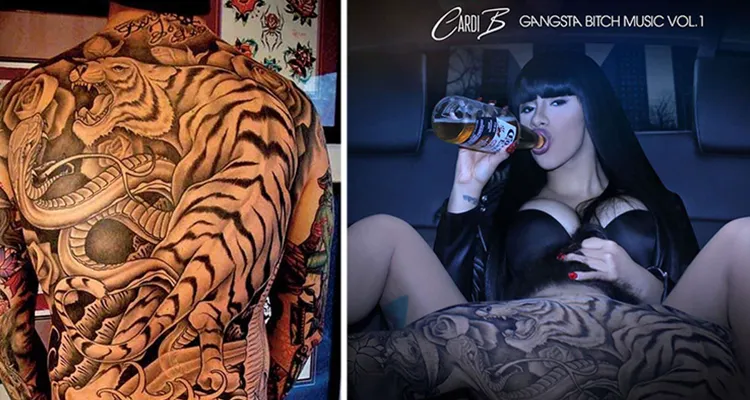Photo Credit: Court Documents
Despite emerging victorious at trial last year, Cardi B is now facing another round in the much-publicized “back tattoo” lawsuit that was first filed against her in 2017.
Plaintiff Kevin Brophy Jr. just recently moved to revive the years-running legal battle, which has followed Cardi B (full name Belcalis Marlenis Almanzar) from her mid-20s and into her 30s. For background, the relatively straightforward action revolves around the cover image of the rapper’s first mixtape, 2016’s Gangsta Bitch Music, Vol. 1.
Featured prominently in said cover image is the heavily tattooed back (but not the face) of Toronto-based The6AtSix, who assumed a compromising position before Cardi B when posing for the shot. Brophy Jr. claims that his son – five years old when the suit initiated but currently approaching or in his teen years – presented him with the cover photo.
And needless to say, the unexpected situation brought with it a collection of awkward questions, which are said to have laid the groundwork for Brophy Jr.’s complaint. Additionally, the plaintiff maintains (among other things) that the lookalike tattoo has caused professional difficulties because he frequently removes his shirt at his surf-marketing job.
Now, after Cardi B’s 2019 deposition, multiple dismissal attempts, the rapper’s initially noted trial victory, and an unsuccessful late-2022 effort to vacate the judgement, Brophy Jr. and his legal team are once again pushing for a new trial.
This latest attempt to overturn the jury’s verdict came to light in a Rule 59 motion (and an associated memorandum) from the plaintiff and his counsel, who allege that “two significant prejudicial errors of law” resulted in an “unfair trial.”
The first of these alleged prejudicial errors of law involves Brophy Jr.’s purportedly being “deprived of his fundamental and substantial right to cross-examine Cardi B at trial.” Ahead of this trial, the court determined that “each party would have two opportunities to examine each witness,” per Brophy Jr.’s motion.
“When Plaintiff called Almanzar, to the stand, it was clear she had no interest in answering the questions posed, and instead engaged in a variety of theatrics,” Brophy Jr. and his attorneys wrote of Cardi B’s initial examination during the trial. “Almanzar refused to answer simple questions, repeatedly veered off-topic and disclosed privileged and confidential mediation communications.”
Bearing in mind this point, the presiding judge is said to have ended the rapper’s time on the stand before the aforesaid cross-examination.
“When Defendants’ examination concluded,” the motion recaps, “Plaintiff’s counsel stood up to exercise Plaintiff’s right to cross-examine the witness. However, the Court immediately ended the examination, and excused Almanzar from the stand.”
Regarding the second of the above-noted “prejudicial errors of law,” the filing likewise takes aim at the court’s alleged decision to exclude evidence from Cardi B’s separate defamation trial. The “Up” artist won the latter with the same trial counsel as in the tattoo suit, per the plaintiff, who says that those claims “are strikingly similar to the claims in this case.”
“It was prejudicial error to exclude the Atlanta Trial evidence on FRE 403 grounds, without examining the actual evidence proffered in response to Defendants’ untimely oral motion in limine. This error requires a new trial,” the legal text drives home.
Finally, the plaintiff believes that he’s entitled to a new trial even if the presiding judge doesn’t agree with the full scope of the arguments pertaining to the defamation-case evidence and the lack of a cross-examination.
“Here, even if the Court concludes its erroneous exclusion of the Atlanta Trial evidence and summary denial of Plaintiff’s right to cross-examine Defendant Almanzar were insufficiently prejudicial by themselves, the cumulative impact of those errors, along with Almanzar’s recalcitrant trial tactics, were sufficient to affect Plaintiff’s substantive right to a fair trial and a new trial should be ordered,” the motion reads towards its end.

